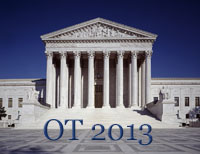US Supreme Court Review: Constitutional Criminal Cases
(This is another post in our series, Looking Back at the U.S. Supreme Court’s 2013 Term.)
In my previous post, I discussed the Court’s recent Fourth Amendment decisions. Here are this term’s other criminal cases that also center on constitutional issues (excluding habeas decisions):
- Kansas v. Cheever, 571 U.S. __ (2013) (prosecutors could use testimony based on court-ordered mental examination of defendant in order to rebut defendant’s intoxication defense).
- Hall v. Florida, 572 U.S. __ (2014) (in capital case, state may not categorically limit intellectual disability defense to individuals with an IQ score of 70 or lower — see my earlier post here).
- Kaley v. United States, 571 U.S. __ (2014) (when trying to overturn pretrial asset freeze affecting funds to be used for legal representation, defendant may not challenge grand jury’s probable cause determination).
- Martinez v. Illinois, 572 U.S. __ (2014) (after jury empaneled and sworn, judge’s grant of defendant’s motion for “directed findings of not guilty” counted as acquittal for double jeopardy purposes and precluded appeal by state).
A notable recurring theme across this set of decisions is the Court’s desire to maintain a particular competitive balance at criminal trials.


 The majority opinion in the Supreme Court’s decision in the Hobby Lobby case is founded on the Religious Freedom Restoration Act (RFRA) and the restrictions it places on the Secretary of Health and Human Services (HHS) when she regulates and enforces the Affordable Care Act (ACA). While the issues raised by Justice Ruth Bader Ginsburg’s dissenting opinion as to the battle of interests protected by the Constitution are significant, an important practical legal issue that was not addressed in the Hobby Lobby case is the power of HHS to interpret the meaning of the ACA. Considering the majority’s reliance on two terms that go undefined by the Court — “sincere religious belief” and “closely held corporation” [see page 29 of the slip opinion and footnote 28] — and the fact that none of the other Hobby Lobby opinions address the meaning of these terms, it is essential that these terms be defined as they fit into the ACA context.
The majority opinion in the Supreme Court’s decision in the Hobby Lobby case is founded on the Religious Freedom Restoration Act (RFRA) and the restrictions it places on the Secretary of Health and Human Services (HHS) when she regulates and enforces the Affordable Care Act (ACA). While the issues raised by Justice Ruth Bader Ginsburg’s dissenting opinion as to the battle of interests protected by the Constitution are significant, an important practical legal issue that was not addressed in the Hobby Lobby case is the power of HHS to interpret the meaning of the ACA. Considering the majority’s reliance on two terms that go undefined by the Court — “sincere religious belief” and “closely held corporation” [see page 29 of the slip opinion and footnote 28] — and the fact that none of the other Hobby Lobby opinions address the meaning of these terms, it is essential that these terms be defined as they fit into the ACA context.